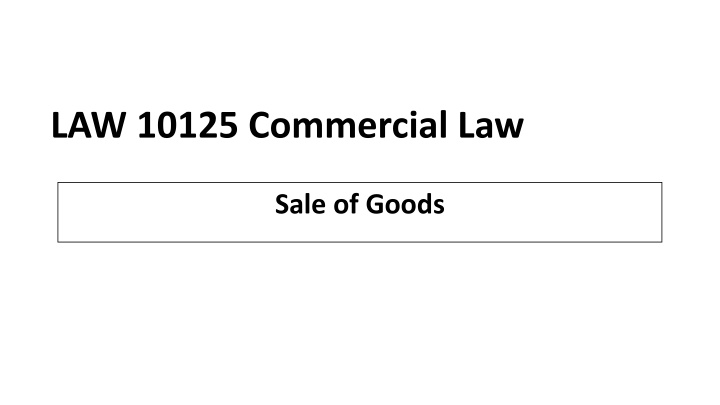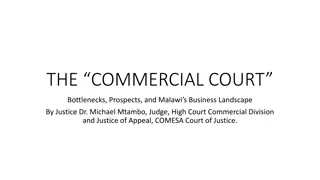LAW 10125 Commercial Law
Exploring the Sale of Goods Ordinance in Sri Lanka governing contracts related to the transfer of property in goods. Learn about contracts of sale, agreement to sell, and classification of goods in commercial transactions under implied terms and conditions.
Download Presentation

Please find below an Image/Link to download the presentation.
The content on the website is provided AS IS for your information and personal use only. It may not be sold, licensed, or shared on other websites without obtaining consent from the author.If you encounter any issues during the download, it is possible that the publisher has removed the file from their server.
You are allowed to download the files provided on this website for personal or commercial use, subject to the condition that they are used lawfully. All files are the property of their respective owners.
The content on the website is provided AS IS for your information and personal use only. It may not be sold, licensed, or shared on other websites without obtaining consent from the author.
E N D
Presentation Transcript
LAW 10125 Commercial Law Sale of Goods
Introduction to the Law of Relating to Sale of Goods The Sale of Goods Ordinance No. 11 of 1896 and its amendments, are the applicable law for sale of goods contracts in Sri Lanka.
S. 2(1) of the Ordinance A contract of sale of goods is a contract whereby the seller transfers or agrees to transfer the property in goods to the buyer for a money consideration called price.
Contract of sale The property in the goods is transferred from the seller to the buyer. Agreement to sell Where the transfer of the property in the goods is to take place at a future time, or subject to some condition thereafter to be fulfilled.
Subject matter of the contract are the goods. Goods can be classified as ; Existing goods Goods which are owned or possessed by the seller at the time of entering in to the contract of sale. Future goods Goods which are to be manufactured or acquired by the seller after making of the contract of sale.
Existing goods can be further classified as; Specific/ascertained goods - Goods that are identified and agreed upon at the time of entering in to the contract. Unascertained goods - Goods that have been defined by description only and not goods identified and agreed upon when the contract was made.
Implied Terms Implied Warranties Implied warranty that the buyer shall have and enjoy quiet possession of the goods. Implied warranty that the goods shall be free from any charge or encumbrance, which was not known to the buyer before the contract was made.
Implied Conditions Implied condition on the seller that he has a right to sell the goods (In a sale). Implied condition on the seller that he will have a right to sell the goods at the time the property passes on to him (In an agreement to sell).
Where the buyer makes known to the seller the purpose for which the goods are required, there is an implied condition that the goods shall be fit for such purpose. But, this will not apply in the case of an article specified under its patent or trade name. When goods are bought by description there is an implied condition that the goods shall correspond with such description.
Implied terms In a Sale by Sample In a Sale by Sample The bulk shall correspond with the sample in quality. The buyer shall have a reasonable opportunity to compare the bulk with the sample. Goods are free from any defect which will make them merchantable, and which defect would not be apparent upon a reasonable examination of the sample.
Implied terms In a Sale by Description Implied condition that the goods shall correspond with the description In a contract for the sale of goods by sample as well as by description, there is an implied condition that the bulk of the goods should correspond with the sample as well as with the description.
How Exceptional Clauses Effect These Implied Terms Sec 54 of the Sale of Goods Ordinance deals with this. Where any right, duty or liability arises in a contract of sale by the implication of law, it maybe negative or varied by express agreement or by the course of dealing between parties or by usage. But the seller s ability to restrict his liability through Exemption Clauses has been greatly reduced by the Unfair Contract Terms Act.
unfair contract terms act No 26 of 1997 S. 7(1) Any exemption clause seeking to exclude / restrict liability for breach of obligation arising from Section 13 SOG Ord. S. 7(2) Any exemption clause purporting to restrict / exclude liability arising from Sec. 14, 15, 16 of the SOG or corresponding sections of the Consumer Credit Act is void and is of no effect as against the person dealing as consumer.
Transfer Transfer of of P Property roperty Between Seller and Buyer Property = Ownership Passing of property in unascertained goods The property transfers from the seller to the buyer at the time the goods are ascertained.
Passing of Property in Specific or Ascertained Goods The property transfers to the buyer at the time the parties to the contract intend to be transferred. To determine the intention, the following rules will apply; In a contract for the sale of specific goods in a deliverable state, the property passes when the contract is made. E.g.: Philip Head and Sons v. Showfronts (1970) Lloyd s Rep.140 When the seller is bound to put the goods in to a deliverable state, property does not pass until this act is performed and the buyer notices the same. When the seller is bound to weigh, measure, test or do something to ascertain the price of goods which are already in a deliverable state, property does not pass until it is done.
When the goods are delivered to the buyer on approval or on sale or return or similar basis, the property passes to the buyer; When he signifies his acceptance to the seller. Does not signify his acceptance but retains the goods without giving notice of rejection. E.g.: Kirham v. Attenborough (1897) 1 Q.B. 201
Remedies for the seller To maintain an action for the recovery of the price of the goods To maintain an action for damages for non- acceptance of delivery Right of lien in goods Right of stoppage the goods in transitu
Remedies for the buyer To maintain an action for damages for non-delivery of goods To initiate an action for the specific performance To maintain an action for the recovery of the price of the goods he has already paid to the seller To claim damages for breach of a warranty in the contract of sale To maintain an action for breach of a condition in the contract of sale























